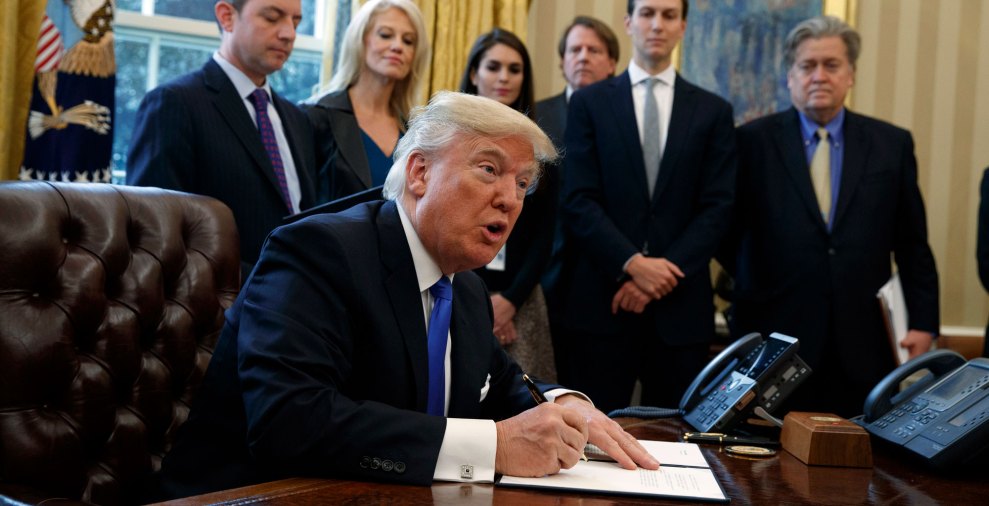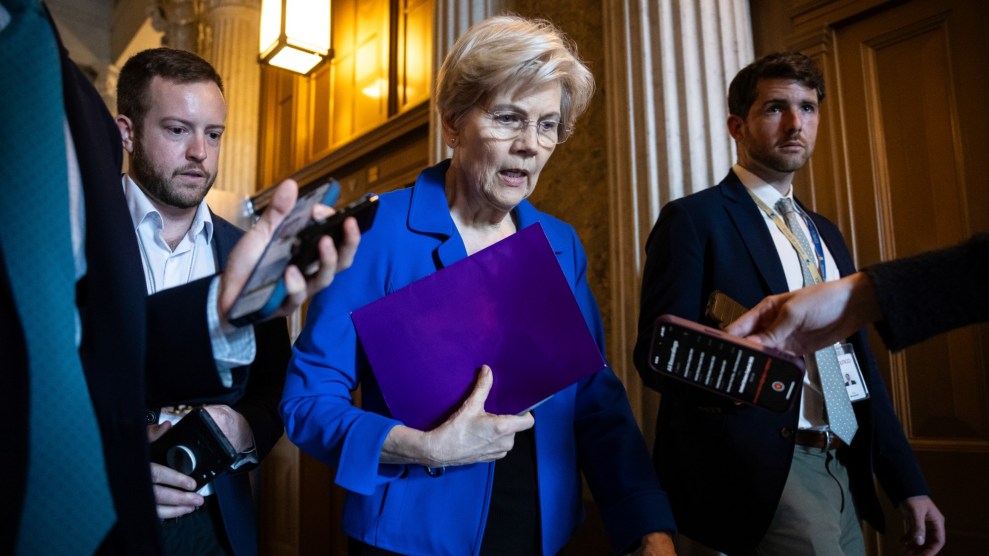|
||||
HED
DEK
Why Can’t All Us Sinners Get Married?
Bush wants some sinners to be blocked from the institution of marriage. But could his stance on gay marriage alienate him from the moderate political spectrum and possibly cost him the 2004 election?
Visa Verite
Protecting Americans and their jobs is the latest isolationists’ pompous mantra.
Why Can’t All Us Sinners Get Married?
WILL YOU ARE A SINNER. BODY TEXT GOES HERE.
Why Can’t All Us Sinners Get Married?
In his press conference last Wednesday, George W. Bush — among other things — proposed a constitutional ban on gay marriage. His attempt at assuaging the conservative right, however, has left many moderates shaking their heads in disbelief.
“I am mindful that we’re all sinners,” said our fearless leader. “And I caution those who may try to take the speck out of the neighbor’s eye when they’ve got a log in their own,” he said dredging up a biblical passage. But Dubya apparently thinks some sinners (read: homosexuals) are worse than others — and deserve a lot less marital constitutional protection. That’s why he’s going to “codify” the “sanctity of marriage.”Ê
Many lawmakers on both sides of the fence are mind-boggled by Bush’s latest proposition that came after a flurry of uproar from the religious right. They argue that state court cases may trump an existing statutory law precluding gay marriage. But some lawmakers point out that the so-called “sanctity of marriage” has already been “codified” by former president Bill Clinton. Patrick Guerriero, president of Log Cabin Republicans (an organization that purports to create an inclusive Republican Party that stands for the principles of limited government, individual liberty, individual responsibility, free markets, and a strong national defense), argues that Bush’s proposal to codify marriage would merely be duplicating existing law:Ê
“Log Cabin reminds the President that the Defense of Marriage Act (DOMA), signed by President Clinton in 1996, defined marriage as being between only a man and a women. The bill passed Congress with bi-partisan support. There are far more important priorities facing our nation than duplicating existing federal legislation. We encourage the White House to focus on winning the war on terror and jump-starting the American economy.”
Also, as the San Francisco Chronicle’s Carolyn Lochhead, points out, gay activists warn that in putting his party “on the wrong side of long term trends,” Bush could alienate the moderate swing voters. His proposition, though it may score points with people like Pat Robertson, is not only a divergence from his earlier more “compassionate” campaign — but it could cost him the 2004 election, reports the Associated Press:
“Bush ran as a ‘compassionate conservative’ in 2000, and is still trying to bridge the gap between his conservative base and critical swing voters. Some advisers fear any hint of intolerance will alienate middle-of-the-road Americans. Recent polls have shown that just over half of Americans oppose gay marriage, and about four in 10 support it.”
Bush’s plan to ban gay marriage, though it sounds appealing to the religious right, is in sharp contrast to what his own lackey, Vice President Dick Cheney has to say on the issue, writes Lochhead:
“Just a few weeks ago, Bush questioned whether an amendment was necessary. The new White House position also contradicts the statements by Vice President Dick Cheney — whose lesbian daughter Mary stood with her partner on Bush’s inaugural stand — in the 2000 campaign.
Cheney said during a debate that marriage is strictly a state domain ‘and that’s appropriate… I think we ought to do everything we can to tolerate and accommodate whatever kind of relationships people want to enter into.'”
Marc Yeager, president of the Georgia Log Cabin Republicans, claims that the gay marriage ban would be an intrusion by the government into the life of individuals. According to the Southern Voice’s Ryan Lee, Yeager further opines that this type of intrusion runs against the idea of conservitism:
“‘This proposed amendment is ridiculous,’ Yeager said.
…
‘Typically conservatism is the limited role of government in individual lives, whereas liberalism, in my opinion, is government involvement in how society is built and evolves,’ Yeager said.
‘Religious fundamentalists are obviously feeling like they need to get a constitutional amendment to control or direct how American culture and society moves forward, and that flies in the face of what conservatism was based upon,’ he said.”
Visa Verite
Post-September 11 visa laws that went into effect Friday could place a burden on the US economy, not to mention keep deserving foreign citizens from jobs, healthcare, and higher education in the US. Students, skilled workers, and even wealthy vacationers who contribute significantly to the US economy and workforce are already exasperated by current visa headaches. But new laws could cause so much delay that the influx of international citizens (and their money and skills) will either go to other Western countries, where the hospitality is seen as more tolerant, or return home.Recent visa legislation requires that every person applying for a nonimmigrant visa participate in an interview with a consulate as the nearest US embassy — embassies that are, in some cases, far away and difficult to reach, especially in developing countries. And the process would be a hassle even for the average middle-class American, reports Abraham McLaughlin of the Christian Science Monitor:
“Indeed, the new approach is the equivalent of a US citizen – who wanted to visit, say South Africa – having to call the South African Embassy on a 1-900 number to schedule an interview several weeks in advance, travel to Washington, D.C., for the interview, stay overnight in a hotel, fly back home to await the visa’s arrival by mail, and only then be allowed to leave on the trip.”
In the wake of September 11, visa reception has often been delayed by two weeks or more. All told, officials expect the new requirements to add two to three months to the wait — and a lot of vacationers, students, and potential employees would rather just go elsewhere. Erik Kirschbaum of Reuters reports that hospitals and hotels in Germany and other European countries are providing airport-shy Arabs with the hospitality they don’t (or can’t, due to visa approval delays) receive in the states. And the industries of Germany can only benfit from the arrival of sheiks, princes, and other wealthy families seeking surgery.
Of course, the US has designated 27 mostly Western nations “visa waiver” countries, reports Emily Bazar of the Sacramento Bee. Citizens of the UK, Finland, and other countries with primarily light-skinned Christian populations won’t have to interview for their business or tourist trips. But to keep things equal, even citizens from the waiver countries seeking medical care from institutions like the Mayo clinic or an education at universities like Notre Dame still have to interview, submit a ton of paperwork and wait, wait, wait . At colleges and universities in the US, every single international student must provide all of his or her personal information to a government-mandated database, the Student and Exchange Visitor Information System, so the feds can “track” their activity. Whatever that means.
Like all the rest of the US’s recent xenophobic legislation, the push to restrict visas would allegedly keep America more secure. But what has many moderate politicians convinced is a bill in the Senate called the USA Jobs Protection Act, which argues that keeping high-tech workers out of the country would provide more jobs for US citizens in the currently wilting economy. Not so, says Dan Haar of the Hartford Courant. Rather, he writes, the legislation
“… feeds on fear and anger over foreign competition, but doesn’t address the main issue – that companies are shipping sophisticated work overseas, as they have shipped out factory jobs for years.”
In testament to Haar’s belief that companies are more willing to find cheap labor elsewhere, Raj Jayadev of Pacific News Service reports that many Indians, instead of wait out a potential visa hassle and endure being pegged as terrorists, are returning to India, where more stable jobs in the tech industry and family support await.
According to the Bee’s Bazar, nonimmigrant visa applicants were always required to interview, but that process was often waived by consular officials. 5.8 million people came to the US on nonimmigrant visas last year. If the attempt to restrict visas is designed to help the economy, evidence seems to demonstrate that it just won’t work. What the restrictions bring about instead is the loss of jobs and companies to countries overseas, a lack of investment by international students into small rural college towns (that a lot of rich American students wouldn’t go near), and the bolstering of the economy by technically skilled workers like pharmacists and IT professionals. But if the attempt of Homeland Security is to increase the image of America as paranoid and intolerant — a perception Kirschbaum in his Reuters article notes is more and more pervasive — it may just succeed.















